Looking at blog income reports from popular blogs, you could think that the only way to make money blogging is to blog about blogging.
Luckily, you would be mistaken.
The reality is that there are successful blogs in all kinds of niches. You simply hear more about the make money online blogs because they are the ones sharing revenue numbers and posting income reports.
While make money blogging bloggers are highly visible, thousands of bloggers earn a living by helping their audience in niches such as dating, automotive, grooming or ultralearning.
These are the “silent” bloggers I wanted to interview for this article. And these are the bloggers, I hope, will inspire you and help you find your blog niche today.
The Gentleman Racer
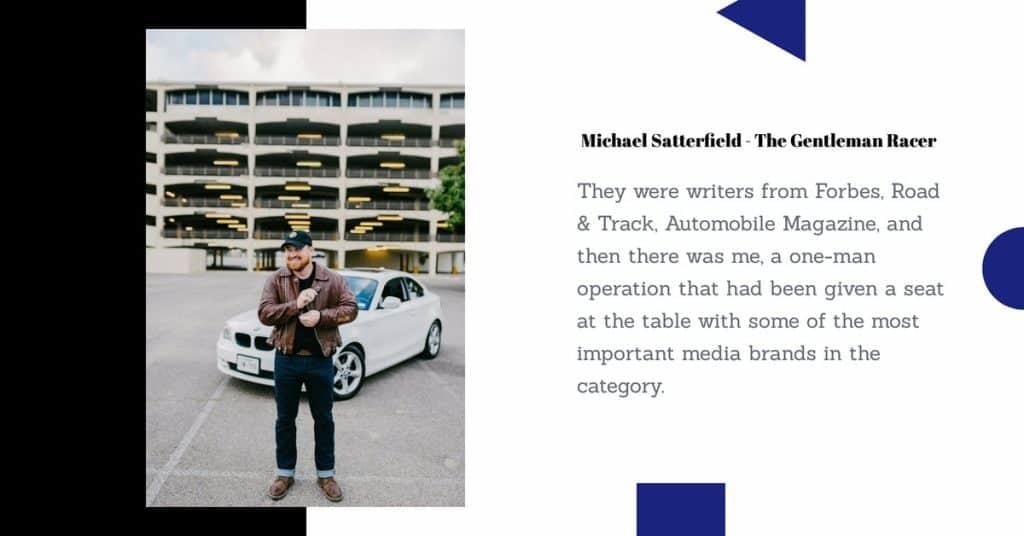
Niche: automotive, menswear, technology, travel
Founder: Michael Satterfield
The Gentleman Racer is a blog in the automotive niche and the perfect proof that a blog doesn’t have to focus on one hyper-specific niche to succeed.
Instead of only writing about the automotive industry, The Gentleman Racer’s founder, Michael, decided to write about the automotive industry plus all other topics he thinks people like him would be interested in.
The result is a popular blog/magazine that tackles topics such as automotive, menswear, technology and travel.
Why did you choose this blog niche?
So while the site is mostly automotive focused, it has grown to include menswear, art, travel, technology, food, pretty much everything guys are into.
I just write about or have contributors write about things that interest me, it could be the latest Aston Martin or an obscure artist I discovered on a road trip.
It has always been my theory that if I find something interesting, there must be at least a handful of other people out there that do as well.
Was this your first niche idea or did you experiment with various niches before deciding on this one?
This is really where I got my start, the automotive industry has been a big part of my life so it is something that comes naturally.
But I have written about business, fashion, travel, and many other subjects over the years. I have launched other sites in different categories that have done well, however, it really takes a lot of effort to maintain more than one vertical.
How do you monetize? Where does most of your income come from?
Mostly brand partnerships, in addition to creating content for TheGentlemanRacer.com for brands, my overall media company (SatterfieldGroup.com) offers creative services and consulting for brands.
We have worked with a number of amazing companies and many cross over to TheGentlemanRacer.com as well.
Advertising revenue is pennies for clicks which is why so many sites crank out clickbait listicles, so we focus on partnering with brands directly or through agencies.
I also don’t do any affiliate marketing, or Amazon affiliate links on the site, while I know that is a major income stream for many in the world of online media, I feel featuring items that can be monetizable doesn’t benefit my readers and erodes trust in my endorsement of a brand or product.
Mind sharing revenue numbers?
It would be hard to really pull out the numbers for the site vs for my work as an influencer, consultant, and creating content for brands.
I also co-founded an apparel company and write for other publications as an editor at large. Needless to say that creating multiple revenue streams is key, and each of mine builds off one another.
How long did it take you to become a full-time blogger?
I started my site in the early 2000s, around 2002, as a part-time fun place to share road trip stories and photos from car shows.
In 2007 it really became viable as a career and I left the automotive aftermarket.
How did you transition from beginner blogger to full-time blogger? Is there one particular event/strategy that made that happen?
I think it really struck me when I was a media event and I was sitting around the cocktail lounge with several other media guests.
There were writers from Forbes, Road & Track, Automobile Magazine, and then there was me, a one-man operation that had been given a seat at the table with some of the most important media brands in the category.
I think that recognition of the value of my voice and audience really struck me and it encouraged me to really push to make this not just a side gig, but a real career.
Did you consider giving up at some point? What kept you going?
Constantly, from being dismissed by some brands as “just a blogger” to having to constantly explain what it is I do to people, it can be tiring.
For me going back to an office and working a 9-5 job wasn’t an option, I grew too accustomed to my freedom, and while I work 10 times more hours than I ever did at a job, I am working for myself.
I also like that I get to use my platform to tell stories that big media companies often ignore because they aren’t going to generate enough clicks. So even if I did have to find a job to pay the bills, I would keep the site going.
Introverted Alpha
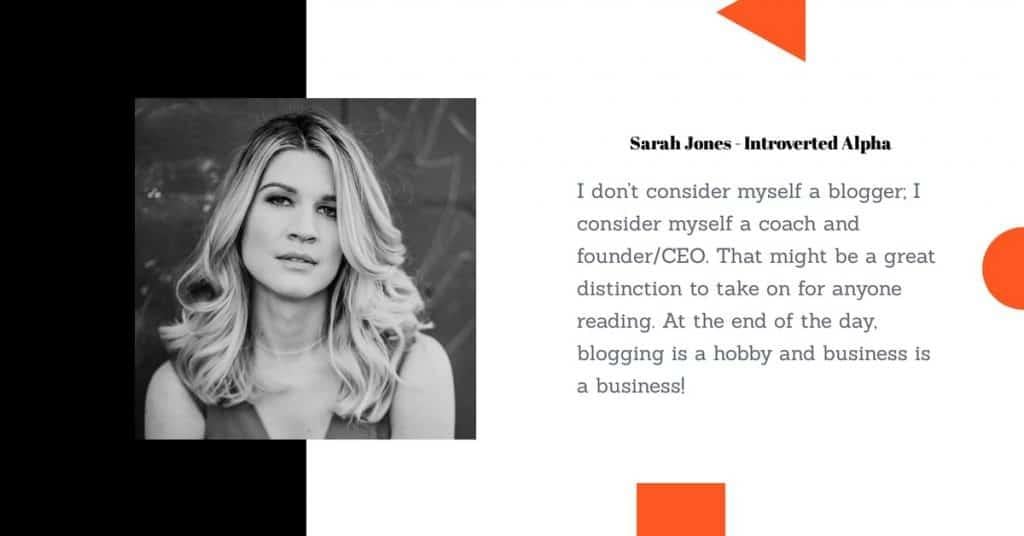
Niche: dating coaching for introverted men
Founder: Sarah Jones
Introverted Alpha is a blog created by Sarah Jones to help introverted men succeed in dating.
I was particularly interested in interviewing Sarah because Introverted Alpha is the perfect example of a blog that found a smaller niche inside a big crowded niche (the dating/personal development niche.)
By focusing on one particular demographic (introverted men) and helping them with one specific problem (dating), Sarah created a successful and beloved blog in an otherwise crowded niche.
Why did you choose this blog niche?
I’ve always loved introverted men like the clients we serve. Our guys are good-hearted, honest, thoughtful, and logical. They are open to learning, and they make the world better as a result of their growth!
Was this your first niche idea or did you experiment with various niches before deciding on this one?
It took me two years from “What is a niche?” to “Smart introverted men, predominantly software engineers, are my niche.” In the meantime were all kinds of things as I dove in and went on my journey of finding the very best fit of who I could help with what. It was not easy, but I was determined!
How do you monetize? Where does most of your income come from?
At Introverted Alpha, we help smart introverted men attract women naturally through our Launch Your Dating Life 12-week program with 1:1 coaching and step-by-step materials.
We also have a program called Become A Benevolent Badass which is the same structure but its content is on social leadership.
Mind sharing revenue numbers?
Early numbers are here and here.
How long did it take you to become a full-time blogger?
I don’t consider myself a blogger; I consider myself a coach and founder/CEO. That might be a great distinction to take on for anyone reading. At the end of the day, blogging is a hobby and business is a business!
Sure we may be able to reach potential clients through the act of writing blog posts, but fundamentally even if our business is just beginning and we have no idea what we’re doing yet (it’s a learning process!), we are founders and CEOs.
For me, it took from site launch in June 2014 to November 2014 to start making a full-time income from the business.
How did you transition from beginner blogger to full-time blogger? Is there one particular event/strategy that made that happen?
When my post, “7 Reasons Introverted Men Are So Damn Attractive,” took off, a longer version of which is on our site now: why introverted men are attractive, it went viral and we got lots of new interest. That was November 2014, 5 months after site launch.
Did you consider giving up at some point? What kept you going?
I never considered giving up, even when I got scared. I love my guys, and I am determined and passionate to support them.
No matter what, I will learn from hard times, even when it’s SUPER hard.
Where there is a will, there is always a way. I love the “burning ships” story when an army went to war and burned their ships so they couldn’t run away. That’s how I approached all this when I started the business almost 6 years ago. It’s been an honor to grow and learn for years alongside Introverted Alpha guys and our team, and I look forward to many more!
Scott H. Young
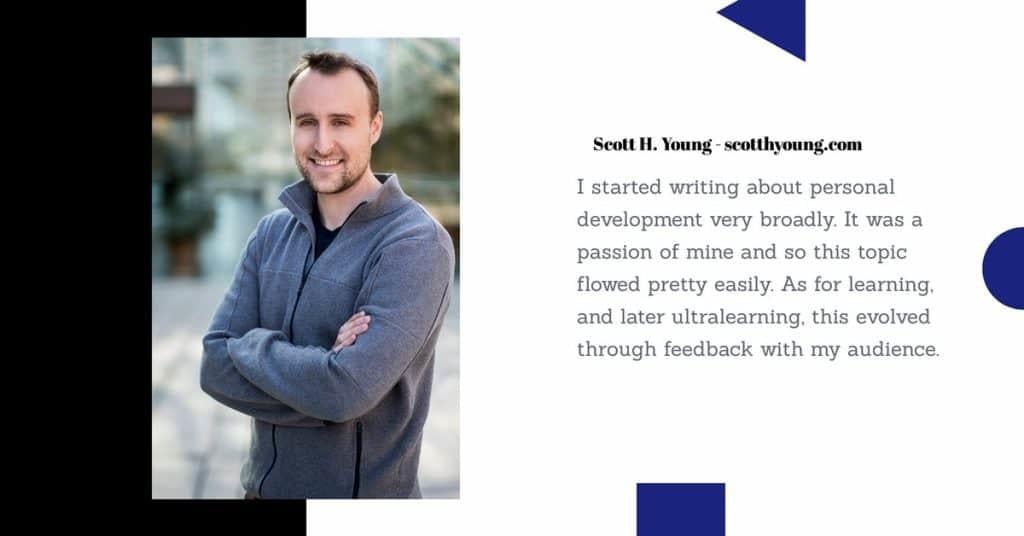
Niche: personal development, learning
Founder: Scott H. Young
Scott is someone I have been following for years and I was curious to hear more about how he found his blog niche.
His story shows that finding a blog niche is often about starting with a rough idea and then perfecting it based on readers’ feedback.
If you feel like writing about a topic you are passionate about but aren’t sure it’s a real niche, Scott’s example shows that it’s worth it to give a try knowing that you can always adapt based on your readers’ feedback.
It’s better to start with a rough idea and perfect it as you go than to spend years dreaming without ever doing anything.
Why did you choose this blog niche?
I started writing about personal development very broadly. It was a passion of mine and so this topic flowed pretty easily.
As for learning, and later ultralearning, this evolved through feedback with my audience.
Early, I had some ideas about learning I called “holistic learning” based on some personal observations and my own experiences studying in college.
These turned out to be some of my more popular (and at least somewhat original) ideas, and so I reinforced that by writing a book Learn More, Study Less, which was more popular and then following up with courses and subscription programs which were how I was eventually able to support myself.
Was this your first niche idea or did you experiment with various niches before deciding on this one?
Initially, I had some success writing articles about habits, but I transitioned away—probably because habits is a much more popular topic.
These both weren’t really decisions to focus on a niche from a marketing point of view. Even to this day, my blog covers many diverse topics. Rather it’s more like my audience nudged me into them from their responses.
How do you monetize? Where does most of your income come from?
The majority of my income comes from courses we sell: Rapid Learner, Top Performer and Make it Happen!.
In earlier phases, however, my income came from ads, affiliates, freelance writing, ebooks, and monthly subscriptions.
How long did it take you to become a full-time blogger?
~5 years. (7 if you include some pre-blogging activities in this direction)
How did you transition from beginner blogger to full-time blogger? Is there one particular event/strategy that made that happen?
A lot of changes happened over five years.
I think there was an aspect to going full-time which was a steady accumulation of readers and growth.
At the same time, finding a model that worked to give myself a livable income happened in a single moment, with releasing an early program I had, Learning on Steroids. That enabled me to work on it full-time, which was around when I was about to graduate from college anyway, so there was a smooth transition from being a student to being a blogger.
Did you consider giving up at some point? What kept you going?
Not seriously, although I definitely had moments of frustration where I felt like being a full-time blogger seemed like a pipe dream. However, I’ve always enjoyed writing so I imagine I’d have continued blogging (albeit, perhaps not as intensively) if I had ended up pursuing a different career path.
Simple Programmer
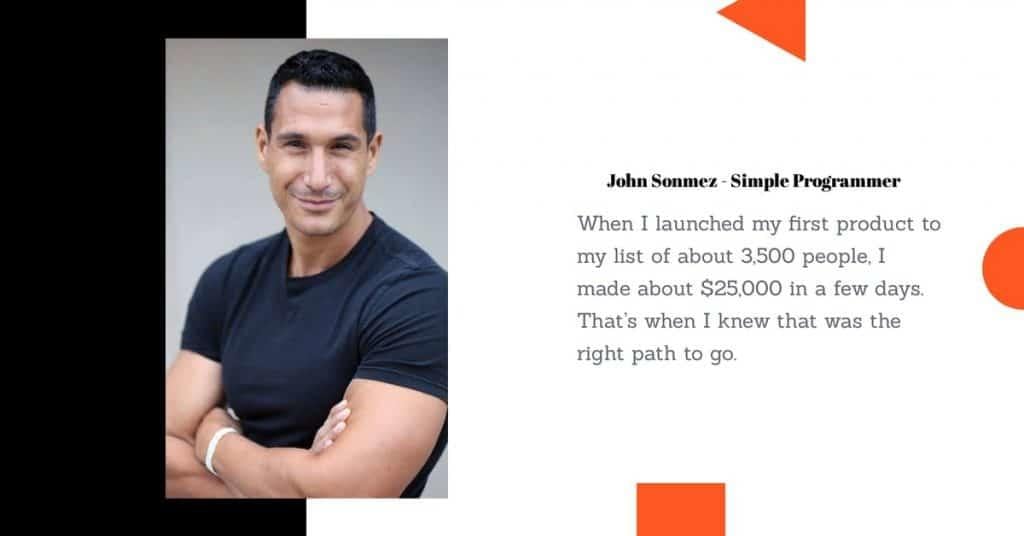
Niche: programming
Founder: John Sonmez
It’s often said that the best business ideas come from founders solving their problems and Simple Programmer is the perfect example of this.
John started Simple Programmer because he noticed a problem (overly complicated programming lessons) and wanted to offer a solution, and his blog grew from there.
Like John, you could find your niche idea by focusing on something that frustrates you or a problem you are having.
Simply ask yourself the following questions:
- What frustrates me?
- What problems have I overcome?
- What problems am I trying to overcome?
The answer to these questions could be the start of a great blog.
Why did you choose this blog niche?
I chose this niche because I was a programmer at the time and I found that other programmers were making programming seem too complicated in order to make themselves seem more impressive.
I want to show people how to make the complex simple and to learn “complex” programming topics easily.
I didn’t know what I was doing at the time or that it would become a business. I was just sharing my knowledge and trying to build a personal brand.
Was this your first niche idea or did you experiment with various niches before deciding on this one?
This was really my first niche. I had tried selling a Palm Pilot application I wrote previously, but there was no content or blogging. I suppose you could call that a niche since it catered to Magic The Gathering Players and was a digital life counter for your Palm Pilot.
How do you monetize? Where does most of your income come from?
At first, I monetized mostly by Amazon affiliate links. But now monetization falls into 4 major categories.
The first is advertising revenue, which is revenue I get from running other companies’ ads in my email newsletter, on the blog directly or on my YouTube channel.
The second is affiliate revenue, which is still some Amazon links, but mostly affiliate promotions I do with partners, sending emails to my email list promoting their products.
The third is product sales, which includes selling my digital courses via email, once people sign up for my email list. My books are also included in the product sales which sell on Amazon. I wrote two best-selling software development books and published them under my brand.
Finally, I make revenue from licencing. Some of the content I create, including my books, is licenses to other companies for use in their library.
Mind sharing revenue numbers?
Simple Programmer makes about $500k a year with most of that being profit since the overhead is very small. Probably about $400k profit right now.
How long did it take you to become a full-time blogger?
It took about 4 years of constant blogging and building the business before I could really quit my job and do it full time and have enough income to live.
How did you transition from beginner blogger to full-time blogger? Is there one particular event/strategy that made that happen?
I worked my regular job while griding out the blog and other business activities at night.
The biggest thing would be creating the email list and selling my own course through that email list.
When I launched my first product to my list of about 3,500 people, I made about $25,000 in a few days. That’s when I knew that was the right path to go.
Did you consider giving up at some point? What kept you going?
Yes, absolutely. Many days I just wanted to throw in the towel. Two things saved me.
First, having a group of other entrepreneurs to share my struggles with. I started a mastermind group that became a podcast called Entreprogrammers. We still record episodes every week.
And second, the book The E-Myth Revisited by Micheal Gerber. That book taught me that I needed to hire a team and how to systemize my business. I would have quit a long time ago if I had to do it alone all this time.
Sustainable Cooks
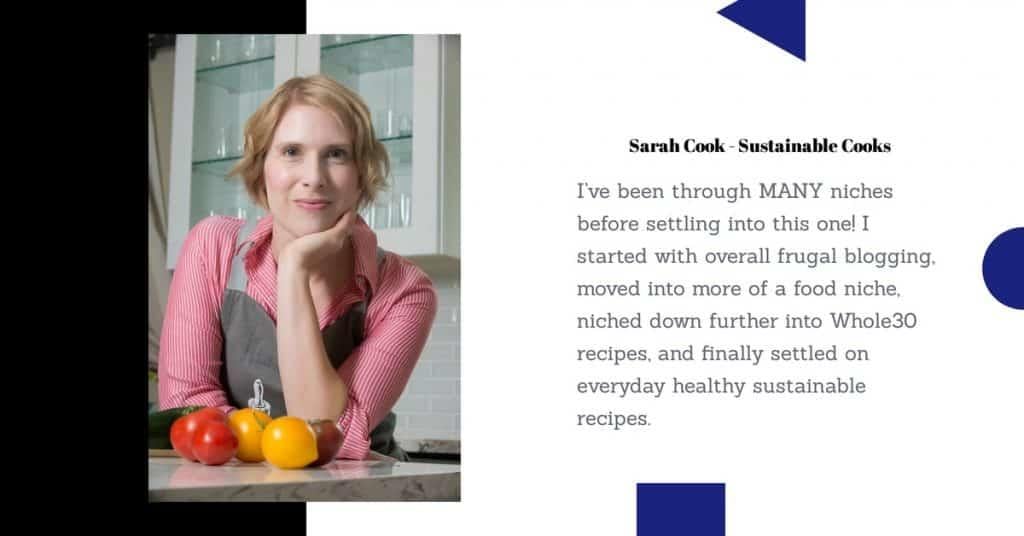
Niche: sustainable budget-friendly recipes
Founder: Sarah Cook
The food blog niche is known for being crowded which is why I was eager to interview Sarah.
Her success shows that it’s possible to succeed in a crowded niche provided you have a unique angle and publish quality content.
If you are thinking about starting a blog in a crowded niche, don’t let the popularity of the niche bring you down.
Instead, follow Sarah’s example and ask yourself:
- What am I uniquely qualified to bring to this niche?
- What makes my approach unique?
- What can I help people with?
And remember, you don’t need to have it all figured out from the start. It’s perfectly fine to try a niche or two before finding the one.
Why did you choose this blog niche?
It’s something I am passionate about and thus never stop wanting to share and help others grow. And because it is how I live my life, I won’t burn out or run out of ideas.
Was this your first niche idea or did you experiment with various niches before deciding on this one?
I’ve been through MANY niches before settling into this one! I started with overall frugal blogging, moved into more of a food niche, niched down further into Whole30 recipes, and finally settled on everyday healthy sustainable recipes.
How do you monetize? Where does most of your income come from?
Ads (90%) and affiliates (10%). I really want to grow the sponsored post angle this year.
How long did it take you to become a full-time blogger?
Way too long but that is because I didn’t have any focus or motivation to make it full-time. Once I joined Mediavine, it took me almost nine months to make a full-time income.
How did you transition from beginner blogger to full-time blogger? Is there one particular event/strategy that made that happen?
No, rather it was a very long road from almost deleting my blog in May 2017 to where I am today.
I was days away from deleting my blog and then I stumbled onto a Food Blogger Pro podcast. At that moment I realized everything I didn’t know about blogging (everything!) and started a journey of education and REALLY hard work.
Practical Wanderlust

Niche: travel
Founders: Lia and Jeremy Garcia
Despite the travel niche’s reputation for being saturated, Lia and Jeremy succeeded in earning a full-time income after roughly a year and a half blogging on Practical Wanderlust.
Pretty impressive and the proof that even blog niches that are considered saturated have space for new entrants.
Their story also shows that finding a niche doesn’t have to be the result of months of deliberation and can simply be born out of your desire to give back to a community.
To follow Lia and Jeremy’s example, ask yourself:
- What kind of blogs do I spend lots of time reading?
- What are communities I interact with a lot?
- What are topics I already write about (on Forums, Facebook groups, Reddit…)
Why did you choose this blog niche?
When I started travel blogging, it wasn’t a business decision. For several years, I was traveling frequently while working full time and dreaming of taking a year-long backpacking trip. The more travel research I did, the more blogs I read, and the more I wanted to contribute to that community.
The travel blogs I was reading were so much more helpful in planning our trips than other resources, and my goal was to give back by contributing travel information that was lacking for destinations I was visiting.
I had never heard of a blog making a full-time income or anything close to it! My only goal was to have a fun, creative outlet and maybe get like, a free hotel stay at some point, maybe.
Fun story: I purchased the domain and hosting for Practical Wanderlust about 3 years before I ever posted anything on it. I actually tried installing Wordpress, broke the site, and it sat as a sad white screen for years until my hosting lapsed. When I resurrected it I started on Blogger because it was easier!
Was this your first niche idea or did you experiment with various niches before deciding on this one?
Practical Wanderlust is not my first blog/online venture, just the first successful one.
I started my first website when I was 13, for cartoon dollz and like, website layouts featuring celebrities I was crushing on.
When I was 16 I started an online store selling kitschy handmade jewelry (think Claire’s, but with random plastic crap from gumball machines or whatever), and a little fashion blog to show off my thrifted finds.
I actually ran the e-commerce business for 6 years and it was my first business love! The fashion blog went nowhere ?
In college, I started a blog around side hustles and frugal tips for college students. I made a little money off of Amazon and that was about it.
But my experience was invaluable: I learned so much about DIY online marketing, basic coding/technical skills, blog writing, photography, and other things that came into play much later.
Every “failed” online venture was actually a fantastic learning opportunity for me. And I also realized that I am happiest when I am working on my own business.
How do you monetize? Where does most of your income come from
Most of our revenue is passive, which means it continues earning even as we travel (or more realistically, sit at home doing nothing).
Display ads and affiliate marketing comprise the bulk of our revenue, next is sponsored content, and then a few random odds and ends like consulting, speaking, and product sales, all of which are not significant earners for us.
Mind sharing revenue numbers?
Let’s just say we are somewhere between 250k and half a million in annual revenue and leave it at that - I don’t want to jinx myself!
We’ve doubled our revenue every year since the blog began and I’m hoping to continue that trend one (last) time in 2020.
How long did it take you to become a full-time blogger?
It took me about a year and a half to officially depend on my blog as my only source of income, but I had the monumental advantage of spending the first year working on it full time while traveling full time.
In terms of time, that accelerated my growth significantly. It would have taken a lot longer if I’d been blogging while working full time - I admire anyone who is able to juggle working and blogging!
How did you transition from beginner blogger to full-time blogger? Is there one particular event/strategy that made that happen?
Honestly, it was more of a stubborn refusal to go back to work.
We had traveled for a year and spent all of our savings, moved back to the pricey Bay Area, and were all set to slide right back into our old lives.
My husband happily went back to work as a high school teacher and I… dragged my feet. I didn’t want to go back to corporate life!
But a teaching salary doesn’t pay Bay Area bills, so I took a temp job to refill our bank account and put in a few job applications. I was interviewing for an incredible job with a promotion and salary increase in Seattle with one of my absolute favorite companies, and I was incredibly torn on whether to take it or not… but after they flew me out for an interview, they ghosted me!
It felt like a sign. I told my husband I was going to blog full time even though it wasn’t even earning enough to cover our rent, and then I worked my butt off until it was earning enough that we weren’t in constant panic mode. I knew that if I could earn a little each month reliably, I could take what was already working and iterate on it. And there’s nothing like panic to light that fire!
Later on, the brand who had ghosted me became one of our sponsorship partners, so things definitely came full circle.
Did you consider giving up at some point? What kept you going?
I’m not sure I’ve considered giving up yet. It’s only been 3.5 years!
Right now my goal is to take more of a backseat to the day to day work of the blog and delegate as much as possible to my wonderful team, which really helps with doing this long-term.
I want to focus my energy more on the fun creative work, like blog writing and producing our new podcast, and on business strategy, which I enjoy just as much.
I’ve also been prioritizing work/life balance and working under 40 hours per week consistently, which really helps avoid burnout.
I know that if I don’t feel like blogging for a week or a month, I’ll be just fine. That helps my mental state so much! I don’t know how long we’ll continue to enjoy success and stability in such a volatile industry, but for the moment I’m having a great time and just taking things as they come.
Sharpologist
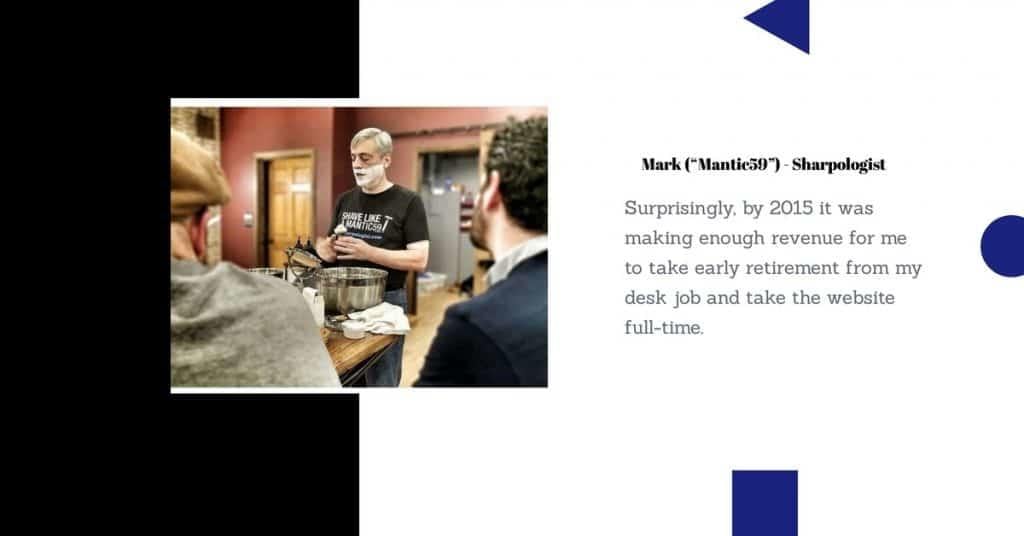
Niche: grooming, shaving
Founder: Mark (“Mantic59”)
Sharpologist is a blog that has emerged as a reference in the shaving and grooming niche and I was eager to interview Mark to find out how it all started.
What I find particularly interesting about Mark’s story is that he didn’t start with the idea of becoming a blogger, his goal was simply to share his passion with the world and he only started a blog when someone suggested it to him.
To follow Mark’s example, ask yourself:
- Is there something people often tell me I’m good at?
- What do people regularly ask me for help with?
- Is there something I already write about/make videos about that could become a blog?
Why did you choose this blog niche?
Sharpologist.com was developed as an evolutionary step from my YouTube shaving videos and original blog on Blogger that started in 2006. The “shave tutor” videos, as they are known, have become the seminal “how to shave” videos, with over nine million views and over 30,000 YouTube subscribers.
https://www.youtube.com/watch?v=xjhIy9rgWQU&list=PL83F9893AA36E2364&index=1
One of my “shaving converts” happens to own a digital media company with almost 20 years of online publishing experience. He suggested I create a “regular” website about old school shaving as a “side gig” in 2011.
Surprisingly, by 2015 it was making enough revenue for me to take early retirement from my desk job and take the website full-time.
Was this your first niche idea or did you experiment with various niches before deciding on this one?
This was my first niche idea because it was related to something I was already doing.
How do you monetize? Where does most of your income come from?
Banner advertising and affiliate products (Amazon, Share-a-sale, Refersion, etc.) right now.
I’m planning my own digital products (courses) by the end of this year.
Mind sharing revenue numbers?
High five-figures. I hope to break six figures this year.
How long did it take you to become a full-time blogger?
About five years.
How did you transition from beginner blogger to full-time blogger? Is there one particular event/strategy that made that happen?
As mentioned earlier, going from a Blogger site to a full-time site (using Wordpress) was the major transition.
The combination of Amazon Associates and a couple of other affiliate programs with generous commissions was a good revenue-generating strategy (though Amazon’s program changes have made that portion more challenging over the past few years).
Psychreg
Niche: psychology
Founder: Dennis Relojo-Howell
Psychreg is a blog in the psychology niche, a niche that most aspiring bloggers rarely consider.
But what I find the most interesting is that Dennis doesn’t simply rely on traditional blog monetization techniques such as affiliate marketing, products or advertising.
Why did you choose this blog niche?
I did psychology at university. So I have always been drawn to psychology, mental health and well-being.
Was this your first niche idea or did you experiment with various niches before deciding on this one?
Interestingly, when I started blogging in 2004 I blogged about travelling. I was a solo backpacker in my early 20s – I travelled within Southeast Asian countries.
But blogging about travel is a very saturated niche, so I decided to move on to blogging about another niche which I’m passionate about: psychology.
Another reason is that I wanted to turn blogging into a career and I felt that it’s quite difficult to get a lot of traffic within the travel niche. So I decided to launch a fresh blog.
How do you monetise? Where does most of your income come from?
A great chunk of my earning comes from sponsored posts.
I also use my blog to position myself as a brand, which would allow me to be invited to speak at events and to organise my own events.
More recently, I published a book and launched a YouTube channel (which led me to have my own radio show).
In contrast to other bloggers, I earn a measly amount from ads.
Mind sharing revenue numbers?
I’m earning as much as a university lecturer would earn.
Aside from that I also I earn from organising events and from YouTube.
How long did it take you to become a full-time blogger? How did you transition from beginner blogger to full-time blogger?
I launched Psychreg in 2014 and after two years I was already monetising it.
Then after two years my blogging income surpassed what I was getting paid working for a PR agency in London – That’s what made me decide to blog full-time.
Did you consider giving up at some point? What kept you going?
I’m an introvert – I thrive working on my own.
So being able to work from home (or anywhere else with a decent WiFi) at my own pace is something that I cherish.
So the question of giving up is not something that has yet crossed my mind. I love blogging, I love designing websites, and I am obsessed with typography. So I’d probably retire a blogger.
French Together

Niche: language learning
Founder: Benjamin Houy
It feels strange to include my own blog in a list of professional blogs because I never thought I would become a successful blogger.
I started French Together because I liked the idea of having a blog and had just spent 7 months teaching in Korea**. I didn’t choose the learn French niche because I was passionate about it but mostly because it felt like the logical next step.**
I also had no idea whether I would succeed or not. All I knew was that I had lots of controversial ideas (learning grammar is a waste of time, for example) and that learning French was something I could help people with.
Like me, you may have controversial ideas that put together could be the basis for a successful blog. Why not write one article or 2 and see where that brings you?
Why did you choose this blog niche?
I have always been passionate about learning languages. I studied lots of languages over the years (English, German, Portuguese, Spanish, Korean…) and have always been fascinated by the ability of languages to connect people. I love the moment when someone recognizes your effort to speak their own language and smiles.
After teaching French in Korea, I decided that it could be fun to try to create a blog helping English speakers learn French. I also felt very frustrated by the way most language courses were only focused on grammar.
I considered other niches such as personal development and blogging but decided to go with languages because it was the niche in which I felt I had the most to contribute at the time.
It also felt like a good choice because my wife was learning French and I thought the content I could write would help her.
She is actually the one who came up with the name French Together :).
Was this your first niche idea or did you experiment with various niches before deciding on this one?
Before French Together, I had a blog helping French speakers learn German. This blog mostly started as a motivation tool and learning journal and eventually managed to earn me a modest income through sponsored content and hum selling backlinks (it was 10 years ago, I wouldn’t recommend this in 2020.)
I also pivoted the niche of French Together on several occasions. I believe I started with making learning French fun, then experimented with learning French without teaching grammar before finally settling on learning the 20% of French that makes up 80% of everyday conversations.
To be honest, I may still pivot in the future. For me a niche isn’t necessarily stable, it’s something that evolves with feedback from readers.
How do you monetize? Where does most of your income come from?
90% of my income comes from the French Together course, a French course that teaches the most common French vocabulary and grammar concepts.
The 10% remaining comes from promoting language tutoring services, language learning app, and a VPN people can use to watch French TV from abroad.
Mind sharing revenue numbers?
I don’t like to share revenue numbers so all I will say is that I reached 6 figures last year.
How long did it take you to become a full-time blogger?
I don’t remember the exact date when I became a full-time blogger but I believe I started earning a full-time income after 3 or 4 years.
It’s important to note that I was living in a relatively cheap city (Berlin) which made it easier.
How did you transition from beginner blogger to full-time blogger? Is there one particular event/strategy that made that happen?
I attribute most of my success to following good SEO basics and building backlinks early on.
This allowed me to quickly get decent traffic numbers. But the event that made me a full-time blogger is the launch of the French Together course.
Before that, I had been selling an ebook on Amazon and experimented with a course teaching French idioms. But the French Together course turned me from a blogger who was earning a decent side income to a full-time blogger almost overnight.
Did you consider giving up at some point? What kept you going?
I knew I didn’t want to work in a normal office environment and this motivated me a lot. But I did consider giving up on multiple occasions. At first when traffic was slow and I felt like I was working a lot for little results.
Then when I launched my ebook and got frustrated by the way so many spammy low-quality books kept appearing overnight on Amazon and made it hard for my ebook to stay visible.
Other times because I felt that my blog wasn’t unique enough. I also remember wanting to give up right before creating the French Together course because I felt like an imposter trying to create a language course without a lot of formal teaching experience.
Despite all of this, I kept going, not because I was sure I would succeed but because it seemed like the best thing to do.
Having a weekly mastermind with supportive bloggers (thanks Fabien and Anna) helped tremendously as well because I kew I didn’t have to face all the challenges of blogging on my own.
Conclusion
Looking at all these examples of professional blogs, I can’t help but notice similarities.
Wanting to give up at some point.
Having doubts.
Trying several niches before finding the one.
Experimenting with monetization strategies.
These are things all bloggers experience. And these are things you will experience too.
Succeeding as a blogger isn’t knowing what you need to do right from the start, it’s simply trusting yourself in the knowledge that you will succeed eventually.
Because successful bloggers aren’t necessarily the ones who found the perfect niche from the start or had the best skills, they are the ones who accepted doubts as part of the journey and never gave up.
So pick the niche you consider the best and start writing. You will have time to figure out the rest later.